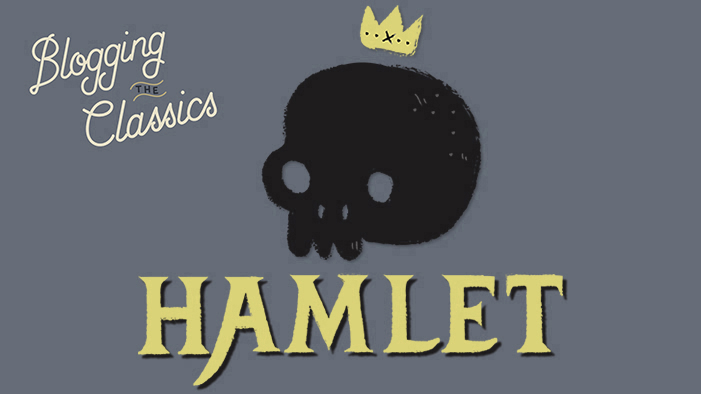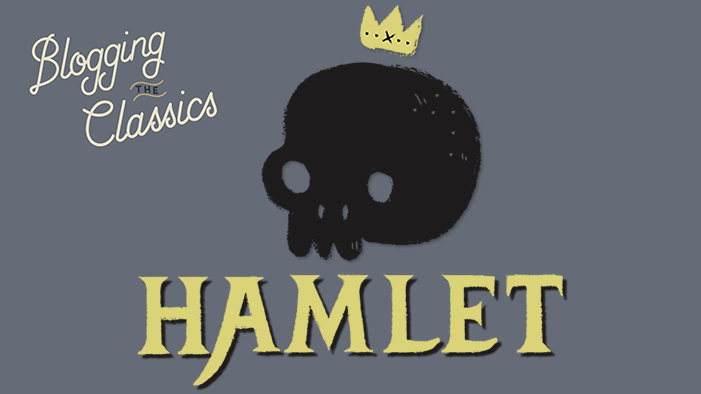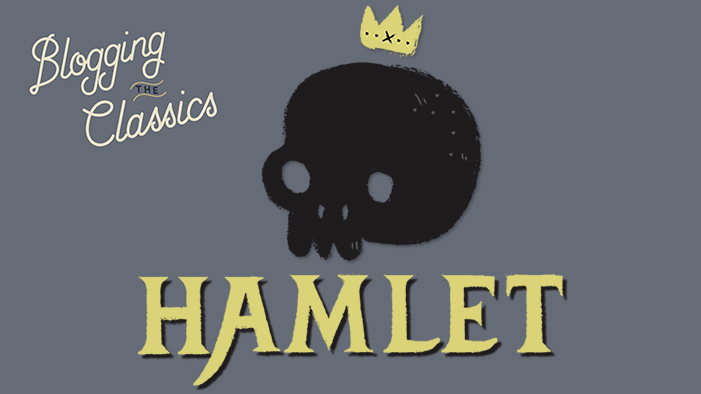Blogging Hamlet: Part 9

In Act 4, Scene 4, a wild subplot appears, and it’s one I’ve completely forgotten about. You’ll remember that Hamlet is being shipped off to England because of that whole thing where he accidentally killed Polonius by stabbing him through a curtain. Rosencrantz and Guildenstern, the least interesting minor characters in all of Elizabethan literature, have been sent to accompany him.
Unbeknownst to Hamlet, however, his uncle Claudius—part-time king of Denmark, full-time king of being a total scumbag—has sent a letter to the king of England requesting that Hamlet be killed. As far as I know we haven’t received a reply from said king or any indication that this plan is moving forward, but for the sake of dramatic irony, we’ll assume that England is always down for a good murder and that Hamlet’s fate has been sealed.
Anyway! The subplot! Hamlet, Rosencrantz, and Guildenstern are just hanging out on the Danish coast, ready to set sail, when they run into the army of Norway. If you’re like me and you have an attention span of approximately .2 seconds, here’s a refresher: Fortinbras was the king of Norway before Hamlet’s dad killed him. Now the younger Fortinbras is—much like Hamlet—seeking to avenge his father’s death.
Or at least, he was. Hamlet speaks to a Norwegian captain and learns that they’re looking for a way into Poland so they can start a war with them for some reason or another. The reason: they want to acquire a small, insignificant Polish territory, and if Fortinbras has to let 20,000 men die to get it done, well, that’s a sacrifice he’s willing to make. This entire exchange speaks to Hamlet on LEVELS. He figures if Fortinbras can condemn hundreds of thousands of men to death for virtually no reason, then he, Hamlet, can surely get off his butt and commit one simple murder.
It doesn’t completely make sense, but let’s put it this way: it’s like spending four days procrastinating on a response paragraph for your English class and then hearing that your friend, in that amount of time, has managed to write two essays, take three exams, decode the entire Rosetta Stone, solve twelve previously unsolved murders, and establish world peace. So you figure, yeah, you should probably stop watching YouTube videos of cats not knowing what cucumbers are and just write the response paragraph already.
(If you’ve never watched cats getting spooked by cucumbers, I can’t force you to improve your life, but just know that you’re missing out in a big way.)
So Hamlet says, “Oh, from this time forth,/My thoughts be bloody, or be nothing worth!” which just means Hamlet has decided that any thought that’s NOT about murder isn’t a thought worth having.
Which brings us to Act 4, Scene 5. And what a scene it is. The first thing that happens is we’re told Ophelia has gone mad. Gertrude refuses to see her, but Horatio persuades the queen to take pity on the poor girl.
Ophelia enters the room, singing bizarre and horrifying songs about
- Death
- Flowers
- Adultery
- Conspiracy theories
So my kind of tune, basically. It’s like 50% nonsense and 50% DIRE WARNING.
Claudius arrives and claims Ophelia’s madness is a result of her father’s death. She begins to sing about a boy who lets a girl into his bed, promises to marry her, and then refuses to do so because she’s not a virgin anymore. It makes you wonder what really went on between Ophelia and Hamlet. But that is neither here nor there, because 100% of the people in this quasi-relationship are now crazy, and half of them are plotting a murder.
Claudius laments that this whole thing has gotten out of control. Polonius is dead, Ophelia is insane, and Hamlet has been exiled—“and he most violent author/of his own just remove!” Claudius might as well have said, “YES, HAMLET’S GONE, BUT WHOSE FAULT IS THAT? DEFINITELY NOT MINE. HE EXILED HIMSELF, BASICALLY.” Ophelia wanders out of the room, and Claudius tells Horatio to keep an eye on her.
Word on the street is that Claudius had a hand in Polonius’s death. People all over Denmark are rioting. They want Laertes, the son of Polonius who’s back from France and heading this way, to be king. This just isn’t Claudius’s week.
Right on schedule, Laertes storms the castle in a rage. He’s got a band of lawless rebels at his side, but he orders them not to attack—not yet, anyway.
Foil alert! The last time we saw Laertes, he was just some college kid cavorting about France and spending money galore. Now he’s the grief-stricken son of a dead father—just like Hamlet, and just like Fortinbras. (Does anyone sense a pattern emerging?) Laertes is also Hamlet’s foil; his unhinged energy and immediate action serve as a contrast to Hamlet’s maddening uncertainty and reluctance. It’s like
HAMLET: *spends four acts wavering between murdering Claudius and not murdering Claudius*
LAERTES: *comes bursting into the kingdom with a sword, Kill Bill sirens blaring*
Claudius is like “WHOA, LET’S TALK ABOUT TIHS,” and Laertes says, “OR I COULD JUST MURDER YOU IMMEDIATELY, WHICH, I’M GONNA BE HONEST, I REALLY LIKE THE SOUND OF.” Laertes says he’s not his father’s true son if he doesn’t avenge his death. (This echoes a sentiment expressed by Hamlet earlier in the play, just in case we didn’t notice the parallels.)
Claudius asks Laertes if he plans to kill EVERYONE—both friends and enemies alike—to avenge his father. Laertes says nah, he’ll stick with just killing enemies. Claudius replies, “Don’t you want to know who they are before you start swinging?” and Laertes admits that okay, yeah, maybe he shouldn’t just go on a misguided murder spree. This is yet another contrast to what we might call The Hamlet Way. Hamlet is slow to action, but he’s no more rational for it—his frenzied behavior led to the death of Polonius. Laertes is a man of action, but he’s willing to hold off and listen to reason when necessary.
Ophelia comes back. Since she didn’t suddenly regain her sanity in the last five minutes, she sings about death some more, and Laertes is shocked and horrified by her madness. He promises to avenge not only Polonius but also Ophelia’s mental state.
He agrees to hear what Claudius has to say. He decides that if Claudius’s story checks out, he’ll set his sights on the real murderer instead. Claudius says cryptically, “And where the offense is, let the great ax fall.” Claudius is really overdoing it with this whole “assassinate the nephew” thing. He’s already ordered the English king to kill Hamlet; now he’s putting Laertes on the case, too.
*KILL BILL SIRENS*
THOUGHTS:
- Remember when things were rotten in the state of Denmark, but secretly? Now the country’s in open revolt and half the characters are out for blood.
- Ophelia’s madness serves as a stark contrast to Hamlet’s—it was sudden, visceral, and brought about by a single misfortune. Hamlet’s, however, was a slow build.
- Speaking of which, all the menfolk—Hamlet, Laertes, Fortinbras Jr.—get to be angry and vengeful about losing their fathers. Ophelia just gets to be crazy.
Catch up on parts 1 through 8 of Blogging Hamlet here, or go check out the SparkNote!















